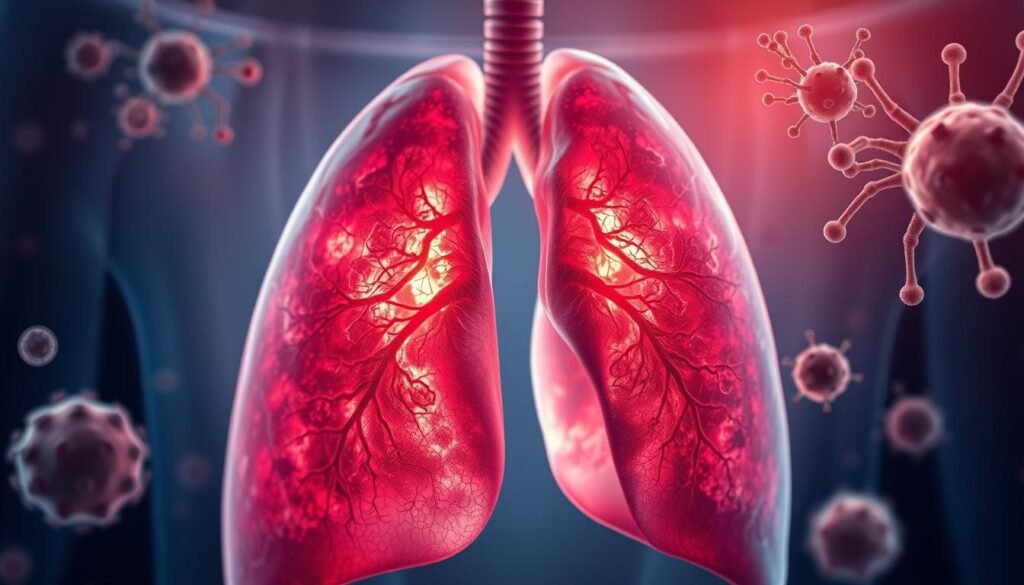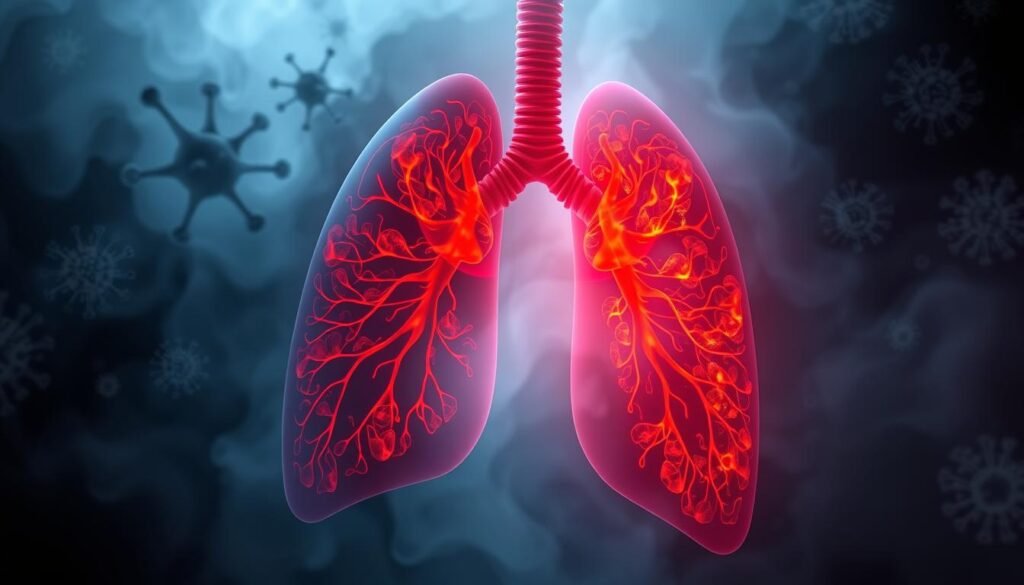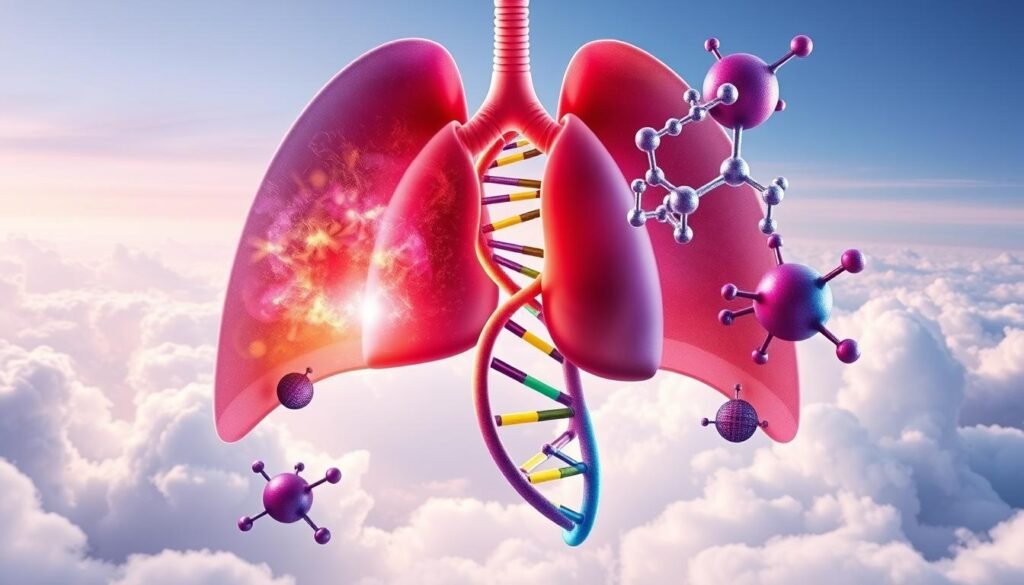Recent studies show that those with rheumatoid arthritis (RA) are at a higher cancer risk. They are twice as likely to get lung cancer than people without RA. This link is important because non-Hodgkin lymphoma affects 2% of U.S. adults. But for those with RA, the risk goes up to about 4%. Lung cancer is a big concern for RA patients. We need to pay more attention to smoking, inflammation, and certain RA treatments.
It’s vital to understand how RA and lung health are connected. This knowledge can help improve how we care for patients and find ways to prevent problems. This article explores the risks, signs, and treatment options for RA patients with lung cancer. Knowing more can lead to early cancer screenings, which are crucial for patients who smoke or are seropositive. For more information, see the detailed study here.
Key Takeaways
- Rheumatoid arthritis significantly heightens the risk for developing lung cancer.
- Patients with RA who smoke are approximately 40% more likely to develop lung cancer.
- Chronic inflammation in RA can negatively impact lung health over time.
- Regular lung cancer screenings are recommended for seropositive RA patients.
- Medications used to treat RA may influence cancer risk, necessitating further research.
- Management of RA and cancer risk requires a careful balance for optimal patient outcomes.
Introduction to Rheumatoid Arthritis
Rheumatoid arthritis (RA) is a major health issue because it is an autoimmune disease. It causes chronic inflammation, mainly targeting the joints. This leads to severe pain, stiffness, and swelling, especially in the hands and feet. RA doesn’t just affect the joints; it can also harm overall health.
RA brings about widespread symptoms like fatigue and anemia, making everyday life harder. The disease triggers a complex immune reaction. This can lead to several health problems, including lung issues.
Every year, around 40 in 100,000 people are diagnosed with RA. It’s more common in women than men. RA increases the risk of heart disease and cancer. These are major causes of death in those with RA.
Studies show RA patients are more likely to get lung cancer, especially older males. In RA patients, lung cancer occurs at a rate of 56 per 100,000 person-years. This is higher compared to the general population’s 33 per 100,000 person-years.
RA patients with certain autoantibodies face a higher lung cancer risk. Between 5% and 10% of RA patients might get interstitial lung disease. These facts highlight the importance of understanding RA’s connection to other health issues.
Understanding Lung Cancer
Lung cancer, especially non-small cell lung cancer (NSCLC), leads in cancer deaths worldwide. It accounts for about 25% of all cancer deaths in the United States. The main risks include smoking, environmental factors, and genetic makeup.

Smoking is the main cause, linked to up to 85% of lung cancer cases. It boosts the risk of bronchopulmonary cancer and raises the chance of rheumatoid arthritis (RA) by about 40%. People with RA face a concerning link to lung cancer. They have a more than 50% higher risk of getting lung cancer compared to those without RA.
Rheumatoid arthritis-associated interstitial lung disease (RA-ILD) shows a strong link with lung cancer. It triples the risk of this cancer over those without RA-ILD. This points out why it’s crucial to screen for lung cancer in people with RA, especially with RA-ILD. Knowing how lung cancer works helps point out who is most at risk and how to catch it early.
We need more research to improve lung health screening and treatment for these patients. For more info on how lung cancer and other conditions are connected, check out this expert interview. It offers deep insights.
Rheumatoid Arthritis and Lung Cancer: The Connection
Studies found a link between rheumatoid arthritis and lung cancer. Lung cancer rates are higher in people with rheumatoid arthritis than in those without it. This information is vital for how we care for patients.
Overview of Research Studies
In those with rheumatoid arthritis, lung cancer occurred at a rate of 58.4 per 10,000 patient-years. For people without RA, the rate was 35.6. This shows those with rheumatoid arthritis are more at risk. The adjusted hazard ratio of 1.58 points to a significant connection between rheumatoid arthritis and lung cancer.
Risk Factors for Developing Lung Cancer in RA Patients
Some factors increase lung cancer risk in rheumatoid arthritis patients. For example, patients with RA-associated interstitial lung disease had a lung cancer rate of 109.3 per 10,000 patient-years. Their adjusted hazard ratio was 3.25, which is quite high. Age, smoking, and other health issues also increase the risk.
Knowing the link between rheumatoid arthritis and lung cancer is crucial. It guides us in monitoring and managing lung health in these patients.
The Role of Autoimmune Disease in Lung Health
Understanding how autoimmune diseases affect lung health is key, especially for people with rheumatoid arthritis (RA). Autoimmune diseases cause chronic inflammation. This can lead to various health issues, including lung problems. Studies show inflammation from RA may cause lung tissue damage and affect the immune response. This could make people more likely to get lung cancer.
Chronic Inflammation and Its Effects
Lung health is at risk due to chronic inflammation. For those with autoimmune diseases, inflammation can change lung tissue. These changes might increase the risk of lung cancer.

A study looked at 349 lung cancer patients. Among them, 177 had an autoimmune disease, mostly RA, affecting 54.8%. On average, they were diagnosed with lung cancer at 67 years. Women made up 76.8% of this group.
This research found that RA patients were more often diagnosed with stage 1 lung cancer than those without RA. It shows the need to watch lung health closely in RA patients. Finding cancer early can make a big difference in treatment.
Understanding how autoimmune diseases impact lung health is crucial. It’s important to know the risks of chronic inflammation. This helps in creating better care plans for RA and lung conditions.
Impact of Methotrexate on Lung Cancer Risk
Methotrexate (MTX) is often used for rheumatoid arthritis (RA) and some cancers. But, its effect on lung cancer risk is debatable. Studies show mixed results—some say it helps, others warn of the risks. The key factors seem to be the dose and how long it’s used.
Scientists have looked into how methotrexate works with other drugs, like aspirin. One study showed combining MTX with aspirin could weaken methotrexate’s effect on lung cancer cells. This means aspirin could make methotrexate less effective in treating cancer.
Research indicates that MTX-treated cells have more FAS protein. Changes in proteins like caspase-3 and Bcl-2 also play a part. These interactions may affect lung cancer risk.
Smoking makes the situation more complex as a major lung cancer risk. People on methotrexate, especially those with RA, must watch their health closely. Their weakened immune system could make them more open to infections and cancer.

Methotrexate is key in treating rheumatoid arthritis, but its cancer risk effects need more study. Patients’ varied responses highlight the need for doctors to watch them closely. This helps in achieving the best care while reducing risks.
Smoking and Its Dual Role in RA and Lung Cancer
Smoking plays a big role in rheumatoid arthritis (RA) and lung cancer. It’s important to look closely at the stats and effects from these conditions.
Statistics on Smoking Risks
Studies show smoking increases lung cancer risks for people with RA. These patients are 1.5 to 3.5 times more likely to get lung cancer. The rate of lung cancer in RA patients is 56 per 100,000 person-years.
This is much higher than the 33 per 100,000 rate in the general population.
| Risk Factor | Incidence Rate (per 100,000) | Hazard Ratio (HR) |
|---|---|---|
| RA Patients | 56 | 1.76 (1.60-1.93) |
| General Population | 33 | — |
| Ever Smokers with RA | — | Approximately 7 times higher |
| Ever Smokers in General Population | — | 4 times higher |
Synergistic Effects of Smoking and Rheumatoid Arthritis
Smoking and RA together greatly increase lung cancer risk. RA patients who smoke are nine times more likely to develop lung cancer. This is in contrast to the fourfold risk in the general population of smokers.
Being ACPA-positive, especially, raises lung cancer risk. This shows the complex role smoking has with RA and lung cancer.
Symptoms of Lung Cancer in RA Patients
People with rheumatoid arthritis (RA) should watch their health closely. They may see lung cancer symptoms that look like RA issues. Spotting these signs early is key for better treatment results.
Recognizing Warning Signs
Knowing the warning signs of lung cancer helps RA patients a lot. They should look out for:
- Persistent cough
- Shortness of breath
- Unexplained weight loss
- Chest pain
These symptoms can be confused with RA, which might cause wrong diagnoses. RA patients must regularly talk to their doctors. This is crucial if they notice any of these symptoms.
Importance of Early Detection
Finding lung cancer early makes a big difference in treatment for RA patients. Studies show early detection means better chances of survival. Timely screenings help catch lung cancer early, improving treatment success.
Doctors need to make sure RA patients get screened right, especially with any lung cancer signs. Catching symptoms early means better treatment and life quality for patients.
Treatment Options for Lung Cancer in Patients with RA
Lung cancer and rheumatoid arthritis (RA) together make treatment complex. Choosing lung cancer treatments, like surgery or chemotherapy, needs special care. This is because these treatments might not mix well with RA drugs. For those on methotrexate or TNF inhibitors, cancer treatments could worsen joint pain. So, doctors specializing in cancer and RA need to work together. They will create a detailed plan for treating the cancer.
Evaluating Cancer Treatment Approaches
Lung cancer patients with RA often live shorter lives than those without RA. This is why they need treatments made just for them. RA treatments, like methotrexate, can make cancer treatment harder. This is due to immune system reactions and side effects. Doctors must look for other options that fight cancer but also keep RA in check. Learning more about biologics is key to help patients with both conditions.
Managing RA During Cancer Treatment
When treating lung cancer, keeping RA under control is key. RA patients might have lung disease too, making treatment tougher. It’s important for doctors to work closely to avoid problems and manage pain. They should also know how cancer treatments and RA drugs affect each other. By working together, doctors can help patients feel better and live healthier lives. For tips on spotting early warning signs, here’s a useful guide on allergy symptoms versus lung.